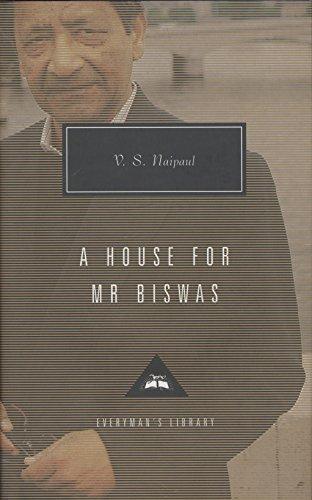The House That Biswas Built
All great civilizations have their Diasporas and their expansions, and traces of the Indian civilization can be unearthed in places as far flung as Bali, Kenya, Trinidad, and British Columbia. Indians stick together to the extent that their communities often appear impenetrable; caste and religion still largely determine whom an Indian should marry or befriend. This may make integration into an adopted land more difficult, but it also makes preservation of culture and custom more secure.
The Indian community of Trinidad has been memorialized by one of its best-known native sons, Nobel Laureate V.S. Naipaul, and especially by his novel A House for Mr. Biswas (1960). Professor Karl Miller has called it "one of the few virtually perfect novels in our language" and the Modern Library placed it among the top 100 novels of the 20th century. Certainly it is the best portrait of an Indian community in a foreign land. And the struggle of Mr. Biswas to procure a house has been compared to the struggle of postcolonial societies to transcend the vestiges of subjection. But above all the novel is a hymn to the human battle against adversity, and how nevertheless death ultimately renders any victory tragic, fleeting, or absurd.
Biswas is born under a bad sign. Indeed, he is born with a sixth finger, but it soon drops off. With his typical scorn for superstition, Naipaul shows the local Hindu pundit declaring that Biswas is never to go near water "in its natural form" and that his father Raghu cannot see him for a period of some days. Even then the first viewing must be as a reflection in a brass plate filled with homemade coconut oil. The boy's mother Bipti obeys. But one day Biswas, charged with supervising a calf, is drawn to some fish in a pond. The calf disappears. Frightened, Biswas hides. And when the disappearance is revealed, Raghu believes both calf and son to have drowned. He dives; he searches; he himself drowns. And the unknowing Biswas is seen as cursed.
An insignificant action, like a butterfly's flight, can often have highly significant consequences, like a typhoon. The action that will change Biswas' life is his decision to tell a young girl named Shama that he loves her. Shama's family swoops down; marriage is arranged practically before the boy's eyes; and he thus irrevocably becomes an appendage of the Tulsi family. And he will blame this family for his subsequent woes, even though it will often stand between him and total ruin.
The marriage is loveless; husband and wife are vengeful, uncommunicative, often estranged. Shama stays with the Tulsis at their "Hanuman House" (named after the Ramayana's monkey-god) while Biswas cowers in his latest attempt at a house. A storm destroys his first house; fire obliterates his second. Biswas soon resembles a caveman, vainly wailing at indifferent and unmerciful gods. And we pity him.
But we do not always respect him. His pride and his single-minded desire for independence drive him repeatedly into folly. He lacks the means for a proper house, so he often settles for one doomed by its inadequacies. He is short-tempered and boorish, and he views his four children as little more than trainees. And his faults make his story less than tragic; he is not a hero but a supremely ordinary man trying, and failing, to become extraordinary.
Mr. Biswas is not a good Hindu. Though he is a Brahmin, and though in his youth he tries (and fails) to become a pundit, he is uncommonly skeptical of Hinduism. For a time he espouses the cause of the so-called "Aryans": Hindus hoping to rid Hinduism of its most abhorrent qualities, namely caste and misogyny. He blames the destruction of his first two houses on the local pundit's blessing of them. The pundit also names Biswas' children against his wishes. Biswas is repelled by everything from the smell of sandalwood to songs from the Ramayana; his holy men are the stoics Epictetus and Marcus Aurelius.
Yet wholesale renunciation of Hinduism is impossible. As a charm against immediate danger, he chants "Rama Rama Sita Rama" and advises his children to follow suit. The Aryan movement wishes to modernize Hinduism, not abandon it altogether; and Biswas is scornful of Indian converts to Christianity. He acquiesces to his son's wish to undertake the "thread" ritual marking a Brahmin boy's transition to manhood. And his treatment of Shama makes him a poor advocate of gender equality. She is more a servant than she is a companion; and like her Tulsi sisters she sometimes acts as a target of violent rage.
Language proves divisive. Hindi is used as a semi-secret tongue for gossip and complaint, while even the broken English employed by most characters is seen as a necessity of education and commerce (Trinidad's population includes French, English, and Chinese migrants as well as Negroes; even the Americans make a typically swashbuckling appearance.) Biswas cultivates a collection of English books, and though Shakespeare is initially unapproachable he uses his volume as a notebook. As might be expected, the children lose their Hindi. The melting pot simmers away.
Arguably the Indians of Trinidad feel a stronger attraction toward "the West" than toward India: study in Europe or North America is the brass ring. When the Tulsi boy Owad returns home from England, everyone treats him like a minor god. Everyone, that is, except Biswas, who derides the returnee's blind admiration for the successes of the Soviet Union. Biswas' son follows in Owad's footsteps, but the father's pride is tainted by the son's growing aloofness. Owad for his part "disliked all Indians from India" and provides a litany of reasons why "they were a disgrace to Trinidad Indians." And no one demurs.
Perhaps more important than language and religion in determining Indian identity is the institution of the family. The family is everything, and anyone or anything that threatens the stability of the family is ostracized or destroyed, almost as if the family had its own mysterious and omnipotent immune system. In one of the novel's most poignant episodes, Biswas buys an ornate dollhouse for his daughter Savi as a Christmas gift. The gift is extravagant, and really it is only his dream house in miniature. Worse, Biswas buys nothing for Savi's brother. The Tulsis are appalled. And not long after the gift is given, Shama smashes it to pieces. The act is irrational: why didn't she sell it? But so was the act of purchase. The will of the family must, and does, prevail, lest the family be torn apart by envy, resentment, and the horrible one-upmanship that the Tulsis (and the "Tuttles" and the Naths) seem to relish. The competition comes to the fore (as it often does in India) when the children's examinations arrive: the scores could mean the difference between foreign study and local obloquy. Big losers get the switch.
Biswas gets his house, although in a sense it is the house that gets him. The house is a lemon, overpriced; between down payment and repairs he is left with hardly a penny; and when he dies soon after, Shama is straddled with an unconscionable debt. Biswas dies of heart problems - one might say he dies of a broken heart. But he is, in the truest and most depressing sense, finally liberated. One is compelled to ask, "Was his misery worth it? Is anybody's?"
Upon the novel's publication, Naipaul had been a fiction reviewer for The New Statesman, England's most leftist newspaper. And by choosing the petty bourgeois Biswas as his protagonist (Biswas is by turns a sign-painter, a newspaper reporter, and a social worker) Naipaul produces a novel with some resemblance to works of social realism, a leftist specialty. One of Biswas' tasks as a reporter is to interview "Deserving Destitutes", and after a while members of his own family think that they are as deserving as any.
The clearest ideological divide is between Biswas and Owad, but neither figure seems to speak for Naipaul. Owad "scathingly" ridicules Trinidad's backwardness: in the USSR, he says, they plant rice by shooting it from airplanes. Biswas is incredulous about this and Owad's other references to Soviet progressiveness, but his rejoinders are crude and dogmatic. Owad's scathing comments also become tiresome, and the two opponents part ways to coincide with "the widespread renunciation of communism by distinguished intellectuals in Europe and America." The foppish but articulate Owad comes off no better than the coarse but skeptical Biswas.
Of course the value of a work of literature cannot lie solely in its value as political propaganda. The life of Biswas may call to mind Marx's famous complaint about "the idiocy of rural life", but one can hardly imagine his life to have been bettered by an alternative political system. His family is his master. Before Biswas can think of freedom from government, he first has to establish freedom from his in-laws. He nearly kills himself trying, and dies shortly after succeeding.
* * * * *
Review of V. S. Naipaul's A House for Mr. Biswas, Everyman's Library, 1995.
* * * * *
 ThingsAsian
ThingsAsian
















